 Petzlover
Petzlover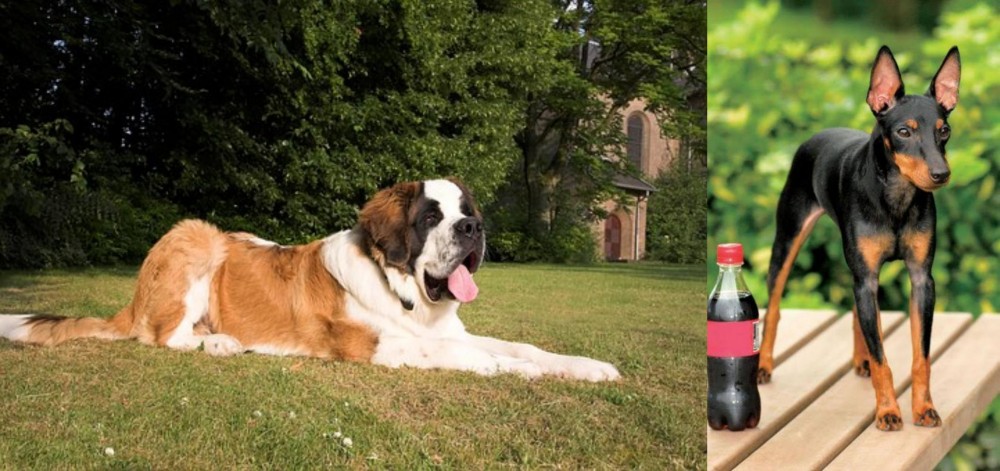 St. Bernard is originated from Switzerland but Toy Manchester Terrier is originated from United Kingdom. St. Bernard may grow 41 cm / 17 inches higher than Toy Manchester Terrier. St. Bernard may weigh 86 kg / 190 pounds more than Toy Manchester Terrier. St. Bernard may live 6 years less than Toy Manchester Terrier. St. Bernard may have more litter size than Toy Manchester Terrier. St. Bernard requires High Maintenance. But Toy Manchester Terrier requires Low Maintenance
St. Bernard is originated from Switzerland but Toy Manchester Terrier is originated from United Kingdom. St. Bernard may grow 41 cm / 17 inches higher than Toy Manchester Terrier. St. Bernard may weigh 86 kg / 190 pounds more than Toy Manchester Terrier. St. Bernard may live 6 years less than Toy Manchester Terrier. St. Bernard may have more litter size than Toy Manchester Terrier. St. Bernard requires High Maintenance. But Toy Manchester Terrier requires Low Maintenance
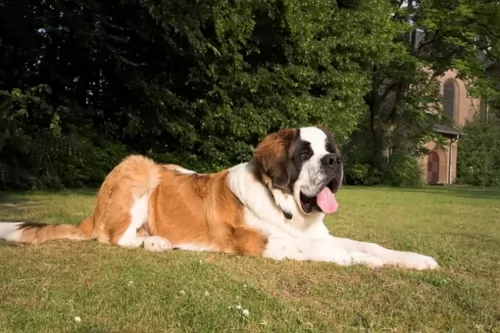 The St Bernard breed was once called the Alpine Cattle Dogs or the Alpine Mountain Dogs. They have always been farm dogs and mountain dogs in the French and Swiss Alps. They come from the border land of Switzerland and France. They were herding dogs, hunting, search and rescue, watchdogs and draft dogs.
The St Bernard breed was once called the Alpine Cattle Dogs or the Alpine Mountain Dogs. They have always been farm dogs and mountain dogs in the French and Swiss Alps. They come from the border land of Switzerland and France. They were herding dogs, hunting, search and rescue, watchdogs and draft dogs.
Their ancestors are considered to include the Sennenhunds and molosser breeds that came to the Alps with the ancient Romans. There are four Sennenhund breeds that are believed to have contributed to the original St. Bernard. These included the Greater Swiss Mountain Dog (Grosser Schweizer Sennenhund), the Appenzeller (Appenzeller Sennenhund), the Bernese Mountain Dog (Berner Sennenhund) and the Entlebucher Mountain Dog (Entlebucher Sennenhund) Today the St. Bernard is considered a Molossoid breed.
The first we know of the St. Bernard in any written records was in 1707 at the Great St. Bernard Pass and Great St. Bernard Hospice run by monks. There were found paintings of the dogs dating back into the late 1600’s. It is told that Barry saved upward of 100 people in the St. Bernard pass, and it is from these stories that the dogs gained their snow rescue reputation.
The St. Bernard of that time did not look like the St. Bernard does today as there was much crossbreeding. Many dogs dies during rescues in the avalanches of the mid 1800’s and so they Saint was crossed with the Newfoundland to preserve the breed. You can today see the resemblance in the build and looks of the two breeds. This cross brought about the long haired St. Bernard whose fur was too heavy for rescues.
The St. Bernards of mountain rescue fame were only about the size of a German Shepherd dog and were short haired. After crossing with the Newfoundland and moving into clubs and dogs shows, they have been bred to be much larger. Before the stud book was closed, it is thought that many larger breeds such as the Greater Swiss Mountain Dog, the English Mastiff, the Tibetan Mastiff, the Rottweiler, the Great Pyrenees, the English Bulldog, the Great Dane, the Bernese Mountain Dog, the Boxer and the Caucasian Oycharka all contributed to today’s St. Bernard.
In 1884 The Swiss St. Bernard Club was founded and the breed entered the Swiss Stud book as its first entry in 1884. It was 1888 when the standard was approved and the breed became the national dog of Switzerland. Before the name St. Bernard came to be common, these dogs might be called, Barry Dogs, Alepnmastiff, Noble Steeds or Saint Dogs.
The dogs came to England in the early 1800s and to the United States soon after. They were recognized by the European kennel clubs first and by the early 1900’s they were the most popular breed in the AKC.
 The Toy Manchester Terrier comes from Manchester and came about by breeding the Manchester Terrier with smaller dog breeds.
The Toy Manchester Terrier comes from Manchester and came about by breeding the Manchester Terrier with smaller dog breeds.
Looking like a Doberman Pinscher, the American Toy Manchester Terrier Club was formed in the 1930s and the dog was recognized in 1938 by the American Kennel Club.
It is believed that the Black and Tan Terrier was also possibly crossed with Whippets. The dog is categorized as a Terrier or as a Toy breed.
 Today’s St. Bernard is not a large dog, he is a giant dog. Weighing in at 140-200 pounds and standing 28 to 35 inches tall, he is a lot of dog. Bred with mastiffs and large mountain dogs, they have proportional and powerful build. They are strong, sturdy and well muscled. They have either a smooth or rough (short or long) coat. Their eyes are brown or occasionally blue. They have tight lids, and square heads and muzzles.
Today’s St. Bernard is not a large dog, he is a giant dog. Weighing in at 140-200 pounds and standing 28 to 35 inches tall, he is a lot of dog. Bred with mastiffs and large mountain dogs, they have proportional and powerful build. They are strong, sturdy and well muscled. They have either a smooth or rough (short or long) coat. Their eyes are brown or occasionally blue. They have tight lids, and square heads and muzzles.
There are two coat types called smooth and rough, or short and long. The smooth shorter coat is tough, flat and close against the body and the long, rough coat is dense, wavy and heavy around the legs, neck and ruff. Both types have long tails that hang low and are heavy. Saints are known to slobber, drool and snore.
 Looking much like a small Doberman Pinscher, the Manchester Terrier is the miniature version of the standard Manchester.
Looking much like a small Doberman Pinscher, the Manchester Terrier is the miniature version of the standard Manchester.
He weighs in the region of 2 to 5kg and stands at between 25 and 30cm in height. He has a sleek, short coat which is black and tan. He is lithe and muscular, bred back in the day to kill vermin. He has large, broad erect ears which taper to a point.
The Toy Manchester Terrier is a gentle but energetic dog, a great choice for an active family. Throw a ball and you’ll see how he loves to give chase, and he’ll also love his walk every day.
They’re adaptable too, so if you live in the countryside or the city, he can be your friend and companion there.
Training and socialization are excellent for all dogs, particularly ones with a stubborn, independent streak such as with this dog. He is intelligent and will learn quickly. They’re alert too so you can expect him to be a good watchdog.
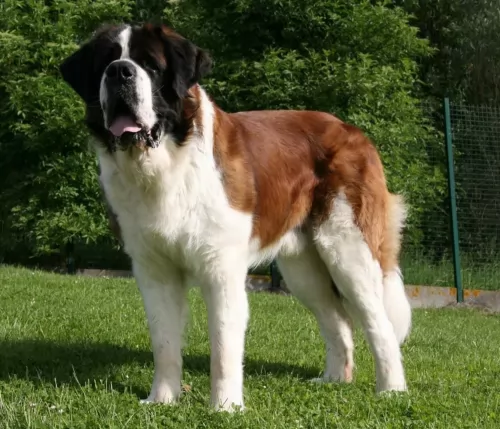 3.Adaptability no - these are giant dogs that need a lot of room. A large fenced yard or farm is best. They won’t do well in an apartment. They need exercise every day and loping around a yard is very good for them. They love to play in the snow, carry a backpack or pull a cart. They love to have a “job”
3.Adaptability no - these are giant dogs that need a lot of room. A large fenced yard or farm is best. They won’t do well in an apartment. They need exercise every day and loping around a yard is very good for them. They love to play in the snow, carry a backpack or pull a cart. They love to have a “job”
4.Learning ability – They are smart and highly trainable if motivated. They may appear lazy but they are just laid back and need a motivation.
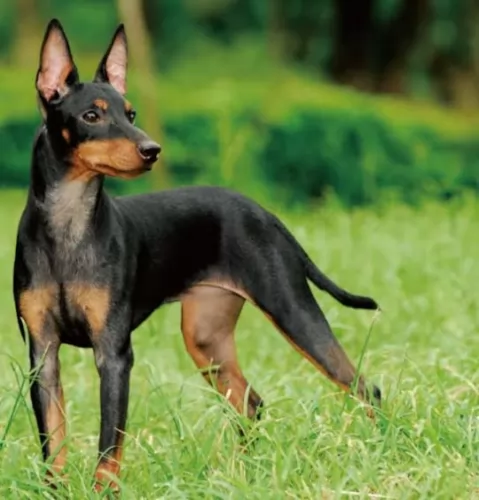 The Toy Manchester Terrier is full of beans and will provide you with lots of fun. They're sociable and love being in the presence of their human family.
The Toy Manchester Terrier is full of beans and will provide you with lots of fun. They're sociable and love being in the presence of their human family.
They get on well with kids and pets in the home and are brave, alert and feisty. He may be small, but he is full of personality and he’s just waiting to fill your home with his bright charm, promising to be a loyal, loving pet.
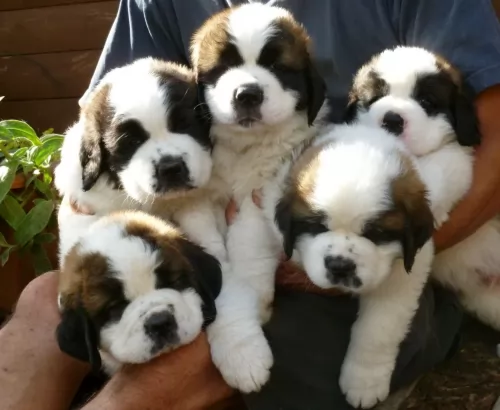 The first problem this breed faces is how fast they grow and gain weight. This can lead to serious health issues if not controlled. Their bones can be damaged by this excessively fast rate of growth. Other issues facing the breed include:
The first problem this breed faces is how fast they grow and gain weight. This can lead to serious health issues if not controlled. Their bones can be damaged by this excessively fast rate of growth. Other issues facing the breed include:
 The Toy Manchester Terrier is a healthy dog breed and can reach anything between 14 and 16 years of age. Good food and exercise can stave off illness, but there are some common dog illnesses that any dog can succumb to.
The Toy Manchester Terrier is a healthy dog breed and can reach anything between 14 and 16 years of age. Good food and exercise can stave off illness, but there are some common dog illnesses that any dog can succumb to.
This occurs when there are problems with the thyroid hormone. You might find skin problems with your pet, lethargy and even hair loss. Your vet might suggest hormone replacement, but there are always natural products for dogs too.
This is when there is degeneration of the head on the femur bone so that there is also joint inflammation.
It is thought that the condition is brought on by problems with blood supply to the femoral head. Lameness sets in and then your vet will want a medical history of your pet’s health.
 1.Feeding the puppy – You want to control their growth. Do not overfeed, and make sure they exercise but not too much. Feed a high quality large breed puppy food 3-4 X a day in small amounts.
1.Feeding the puppy – You want to control their growth. Do not overfeed, and make sure they exercise but not too much. Feed a high quality large breed puppy food 3-4 X a day in small amounts.
2.Feeding the adult – The problem you face with he adult St. Bernard is the potential for Bloat. Don’t over feed. Don’t feed before or after strenuous exercise. Feed 2-3 X a day in smaller amounts to prevent Bloat. Feed a high quality breed specific food if possible or an extra large breed formula.
4. Games and Exercises They need exercise but not as much as you might think. The St. Bernard is a laid back lumbering character so don’t over exercise her. They enjoy weight and cart pulling but they are not athletes who enjoy frisbee or agility. Search and rescue trials and tracking trials are perfect athletic endeavors for them.
 Make sure you provide your pet with yard space and that he is well exercised and occupied. Provide him with exercise and give him attention.
Make sure you provide your pet with yard space and that he is well exercised and occupied. Provide him with exercise and give him attention.
Provide him with a dry, quiet resting place. If he spends time outdoors, he must have shade and sun as well as shelter from the rain.
Provide him with good food in his own special bowls. If you feed him dry kibble, make sure to give him a quality one with vitamins and minerals. The food’s labeling will guide you as to what to buy, but your vet is also a good source of useful information. Try to give him some home-made food too. Boiled chicken, brown rice, sweet potatoes and spinach for instance, are excellent examples. Dont add in exotic spices and curries that can give him an upset stomach. Make sure he has a constant supply of fresh, cool water.
Get your Manchester to the vet if he is ill. Make sure his vaccines are up to date.
He has short hair and is a low maintenance dog. Brush him once or twice a week to keep his shiny coat healthy. Check inside his ears for redness and give him a good check-over to make sure he doesn’t have any odd looking lumps or sores on his body.